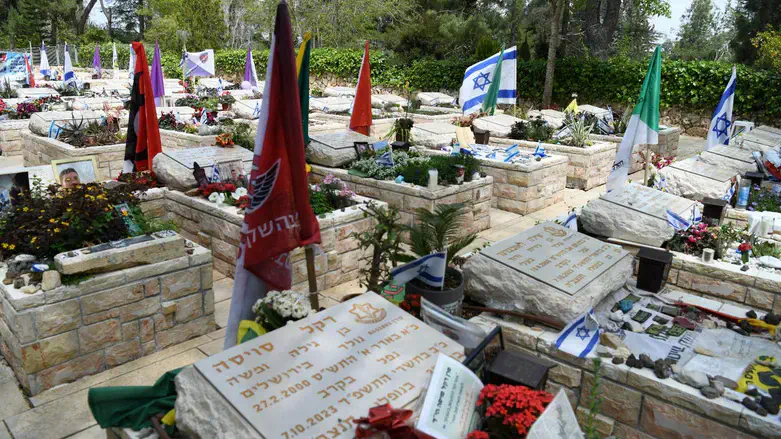
The Department of Families, Commemoration, and Heritage at the Ministry of Defense has published data on the casualties of Operation Swords of Iron so far.
There have been 890 casualties in total, including IDF, Israel Police, ISA, civilian security coordinators, and town emergency squad members who fought in Gaza, the south, north, Lebanon, Judea and Samaria.
The Department of Families, Commemoration, and Heritage at the Ministry of Defense is the state body responsible for commemorating the casualties of Israel's military systems and the welfare of bereaved families while preserving the security heritage for future generations.
The fallen include 808 IDF casualties, 43 town emergency squad members, 75 Israel Police casualties, and 7 ISA casualties. About half of the casualties - 374 - are under the age of 21 and in compulsory service. 272 of them are aged 22-30, 143 are aged 31-39 and another 101 are over 40. Most of the casualties are men – 835 - and 55 women. 629 are singles and 261 are married, leaving behind 306 widows, 645 orphans, and 7 fiancées.
Since 7.10.2023, 6 brigade commanders have fallen, 3 of them in the October 7th massacre.
240 reservists have fallen in various regions, alongside 217 conscripts and 43 town emergency squad members. 390 casualties are mandatory service personnel. The casualties left behind over 1,590 bereaved parents, 306 widows, 645 orphans, and over 2,730 bereaved siblings.
The burial of the casualties in Israel was done at the families' request. 285 casualties were buried in the Jerusalem area with an emphasis on Mount Herzl (160), 239 were buried in central Israel with an emphasis on Kiryat Shaul (39), 184 casualties were brought for burial in the south, and another 174 in the northern area. 8 casualties were transferred for burial abroad with the accompaniment of the Department of Families staff.
Jerusalem has suffered the most losses at 52 casualties. Next is Tel Aviv with 28 casualties and Be'er Sheva with 26, Modiin with 24 casualties, Haifa with 21, Ramat Gan with 17 casualties, Petah Tikva 16, Rehovot, Raanana, and Ashkelon 14 casualties each and Kibbutz Gaza with 13 casualties.
The day of fighting that claimed the most casualties was 7.10.2023, with 358 casualties. On 22.1.2024, 22 soldiers were killed in action during the invasions of Khan Yunis and other sites in the Gaza Strip.
Measures to commemorate the fallen include the establishment of new military cemeteries and plots and expansion of existing cemeteries, large-scale burial in 230 cemeteries and military plots, burial under fire in southern settlements, joint burial of family members, preparation for seven-day memorial services, and compliance with placing gravestones and building graves before the 30-day memorial. The memorial hall added the names of all the casualties on the name wall that surrounds the hall.
A special unit was established to deal with families of hostages and missing persons and build emotional and financial support frameworks. The Ministry has advanced recognition of town emergency squad members as military casualties, recognition of regular soldiers on leave who were in the Gaza region during the October 7th massacre as IDF casualties, recognition of fiancées for economic and emotional benefits, expansion of the emotional support framework and entitlements for divorced casualties, providing a broad framework of support for the thousands of citizens newly bereaved including young bereaved parents, orphans, bereaved siblings, fiancées, common-law partners, and more. The Department recruited welfare workers, social workers, and additional emotional therapists to provide families with professional, sensitive, and unique treatments
The Economic Welfare and Grants Unit worked to supply all information about bereaved families for entitlements, extension of medical benefits, organization grants and support for approximately 229 evacuated families, evacuation and accommodation for bereaved families, and providing relaxation days for families in the north and south in areas of conflict. A special economic framework was formulated from the start of the war to give assistance to widows with children aged 0-6 for child care and household management, cooperation with the Ministry of Justice and legal aid for families, assistance in renting a car and grants for buying a car for large families, a unique grant for purchasing equipment for families from communities designated for rehabilitation by the state, assistance to new families in dealing with the authorities and public bodies, transmission of data to various government and public entities, distribution of laptops to orphans and bereaved siblings aged 6-18 in cooperation with FIDF, evacuation of families from the Gaza region and the north.
The Social Services Unit expanded its activities this year due to the war and opened dozens of new support groups for bereaved families. It operated a network that included thousands of volunteers accompanying the bereaved families, support in the field of employment and prevention of dismissals for bereaved family members, formulation of a personal escort program for orphans aged 4 to 18, formulation of a program for escorting and supporting pregnant widows which includes 33 widows of which 31 have given birth. The cost of the program is estimated at approximately 4 million shekels, and absorption of hundreds of emotional therapists for the welfare of the bereaved family members and more.
Arie Moalem, Deputy CEO and Head of the Department of Families, Commemoration, and Heritage at the Ministry of Defense said "The State of Israel was obtained at a very heavy price and its history was written in the blood of our heroic siblings of glory. A year has passed since the outbreak of the war, which began in the massacre of October 7. The employees and employees of the Department of Families, Commemoration, and Heritage came together to carry out state funerals and give the last honor to the fallen. Afterward, they continued to treat and accompany bereaved families who joined the circle of bereaved."
"The department employees continue in their mission to walk in the path of memory, accompany the fallen on their final journey. Out of a sense of mission, we continue to execute the life command left to us by the fallen, to commemorate their memory, preserve the legacy, and pass on the story of their heroism to future generations as well as continue to support their families in every way, both emotionally and in terms of benefits. We will continue to be here for them every step of the way. We hope for the return of the hostages, pray for the recovery of the wounded, and the safe return of the security forces fighting for our country."

